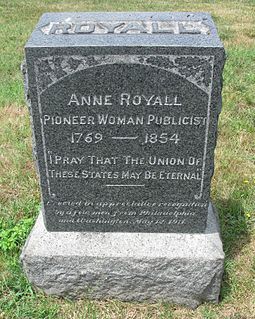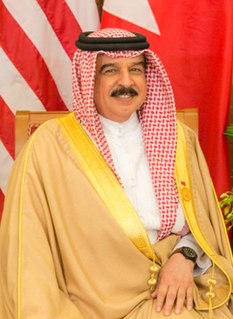A Quote by Anne Royall
[G]et two-thirds of the states to alter the Constitution; come out with their national religion, and then let the people get their throats ready.
Related Quotes
Is the appointment of Chaplains to the two Houses of Congress consistent with the Constitution, and with the pure principle of religious freedom? In strictness the answer on both points must be in the negative. The Constitution of the U. S. forbids everything like an establishment of a national religion. The law appointing Chaplains establishes a religious worship for the national representatives, to be performed by Ministers of religion, elected by a majority of them, and these are to be paid out of the national taxes. Does this not involve the principle of a national establishment ... ?
When I'm writing, I won't know whodunnit until maybe two thirds of the way through. Until then, I know as little as my detective. I just make it up as I go along. It's nerve-wracking, actually. You'll be half through and not know your conclusion. You worry one of these days the ending won't come. I'll be left with only two-thirds of a novel.
But the Chief Justice says, 'There must be an ultimate arbiter somewhere.' True, there must; but does that prove it is either party? The ultimate arbiter is the people of the Union, assembled by their deputies in convention, at the call of Congress or of two-thirds of the States. Let them decide to which they mean to give an authority claimed by two of their organs. And it has been the peculiar wisdom and felicity of our Constitution, to have provided this peaceable appeal, where that of other nations is at once to force.
Yet here we are, two children and a broken promise later, standing before each other, just the way we stood that day at the alter, with equal parts love and hope. And once again, I close my eyes, ready to take a leap of faith, ready for the long, hard road ahead. I have no idea how it's going to turn out, but then again, I never really did.
The Constitution is not a law, but it empowers the people to make laws... The Constitution tells us what shall not be a lawful tender... The legislature has ceded up to us the privilege of enacting such laws as are not inconsistent with the Constitution of the United States... The different states, and even Congress itself, have passed many laws diametrically contrary to the Constitution of the United States.
In a contest between new technology and old ways of life, it is the traditional rhythms that will hold. Traditional societies make up more than two-thirds of the world, the two-thirds that will not be going online to "save" time but will remain wedded to the knowledge that if the bus doesn't come that day, it will come someday. After all, there is nothing but time.
I believe in the Constitution. I believe in separation of powers. I believe in the rule of law. I believe in limited government. And these are principles and policies that apparently neither the national Republican nor the national Democrat Party believes in. I believe great damage is being done to our Constitution, and I see no remedy at all, no likelihood of that changing, if we rely on the two parties to field our candidates for national office.
There is absolutely nothing in the Mormon's religion inconsistent with the most patriotic devotion to the government of the United States. Revelation and the commandments of the church require that the Constitution and the laws of the land be upheld. It is also part of our belief that the time will come when the country will be distracted and general lawlessness prevail. Then the Mormon people will step forward and take an active part in rescuing the nation from ruin.
































